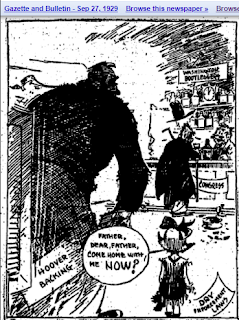Volstead Act Totalitarianism, II-22
 |
| "Or else..." naked deadly force, September 1929 (link) |
Sec. 22. An
action to enjoin any nuisance defined in this title may be brought in the name
of the United States by the Attorney General of the United States or by any
United States attorney or any prosecuting attorney of any State or any
subdivision thereof or by the commissioner or his deputies
or assistants. Such action shall be brought and tried as an action in equity
and may be brought in any court having jurisdiction to hear and determine
equity cases. If it is made to appear by affidavits or otherwise, to the
satisfaction of the court, or judge in vacation, that such nuisance exists, a
temporary writ of injunction shall forthwith issue restraining the defendant
from conducting or permitting the continuance of such nuisance until the conclusion
of the trial. If a temporary injunction is prayed for, the court may issue an
order restraining the defendant and all other persons from removing or in any
way interfering with the liquor or fixtures, or other things used in connection
with the violation of this Act constituting such nuisance. No bond shall be
required in instituting such proceedings. It shall not be necessary for the
court to find the property involved was being unlawfully used as aforesaid at
the time of the hearing, but on finding that the material allegations of the
petition are true, the court shall order that no liquors shall be manufactured,
sold, bartered, or stored in such room, house, building, boat, vehicle,
structure, or place, or any part thereof.
And upon judgment of the court ordering such nuisance to be abated,
the court may order that the room, house, building, structure, boat, vehicle,
or place shall not be occupied or used for one year thereafter; but the court
may, in its discretion, permit it to be occupied or used if the owner, lessee, tenant,
or occupant thereof shall give bond with sufficient surety, to be approved by
the court making the order, in the penal and liquidated sum of not less than
$500 nor more than $1,000, payable to the United States, and conditioned that
intoxicating liquor will not thereafter be manufactured, sold, bartered, kept,
or otherwise disposed of therein or thereon, and that he will pay all fines,
costs, and damages that may be assessed for any violation of this title upon
said property.
This piece of work may be what inspired the Republican Party--as current sockpuppet for the Prohibition Party organized in 1868--to legislate a snitching-for-bounty girl-bullying law La Suprema Corte declined to strike down in September, 2021. Observe the Volstead Act provided no wet-blanket penalty for lying and trying to frame some innocent person. Indeed, there is no need for any "crime" to have been committed--as in the case of today's asset-forfeiture laws allowing simple armed robbery on the part of police, then placing the burden to prove innocence on the victim of what courts considered--before Nixon, Reagan and Biden--extralegal criminal activity on the part of dirty cops.
In the case of United States v. Donnelly, 276 U.S. 505, the court commanded all federal agents and their dry snoops and informants to inform on each other or face fines and imprisonment. The prosecution was handled by Ass't. U.S. Attorney Mabel Walker Willebrandt, the 1920s version of Justice Amy. It was Willebrandt who on August 13, 1929 declared in 20 newspapers:
If I thought that enforcement of the prohibition law would necessarily entail continued killing and other acts of violence, as well as the outrage of private rights of persons and property, I would unqualifiedly join in the demand for the repeal of the 18th amendment and the laws enacted thereunder. Mabel Walker Willebrandt, The Inside of Prohibition, page 123.
Banning production and trade in a non-communist country with a Bill of Rights, she and most women in America discovered, does necessarily entail murder and the violation of all individual rights. Willebrandt went to work for private industry defending raisin companies from having (no kidding) their product banned and confiscated via fines and imprisonment. Yet even today economists shrink from the very thought that murderers with guns and a license to rob might have any effect whatsoever on economic stability. Why?
Get the complete story in Prohibition and The Crash on Amazon Kindle in two languages. After this you’ll be able to explain to economists exactly how fanaticism and loss of freedom wrecked the U.S. economy.

Prohibition and The Crash, on Amazon Kindle
Brazilian Sci-fi from 1926 featuring the usual beautiful daughter of a scientist touting prohibition and racial collectivism in America’s Black President 2228 by Monteiro Lobato, translated by J Henry Phillips (link)
I also produce books and articles in Portuguese, using Brazilian historical sources at http://www.expatriotas.blogspot.com or amigra.us





Comments
Post a Comment